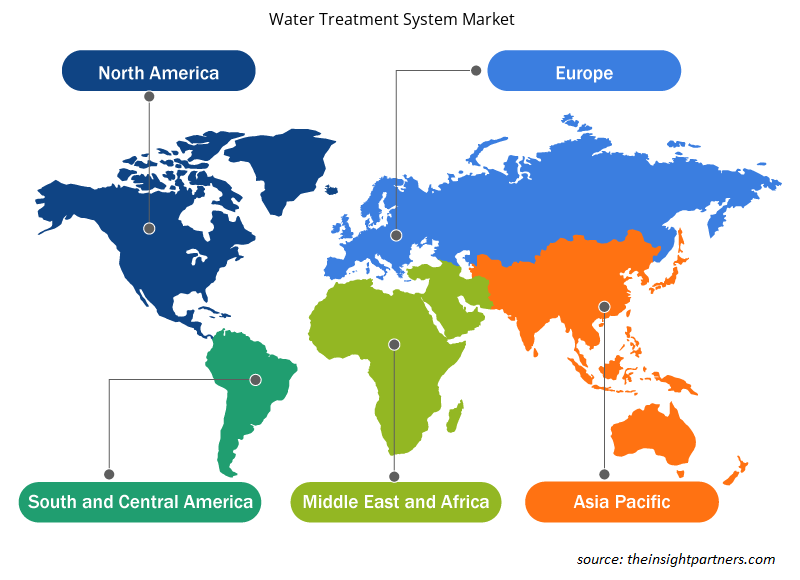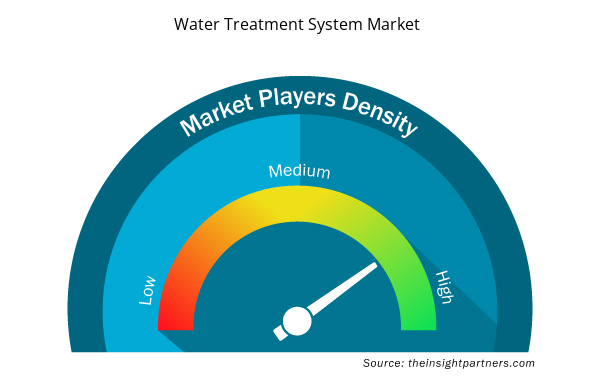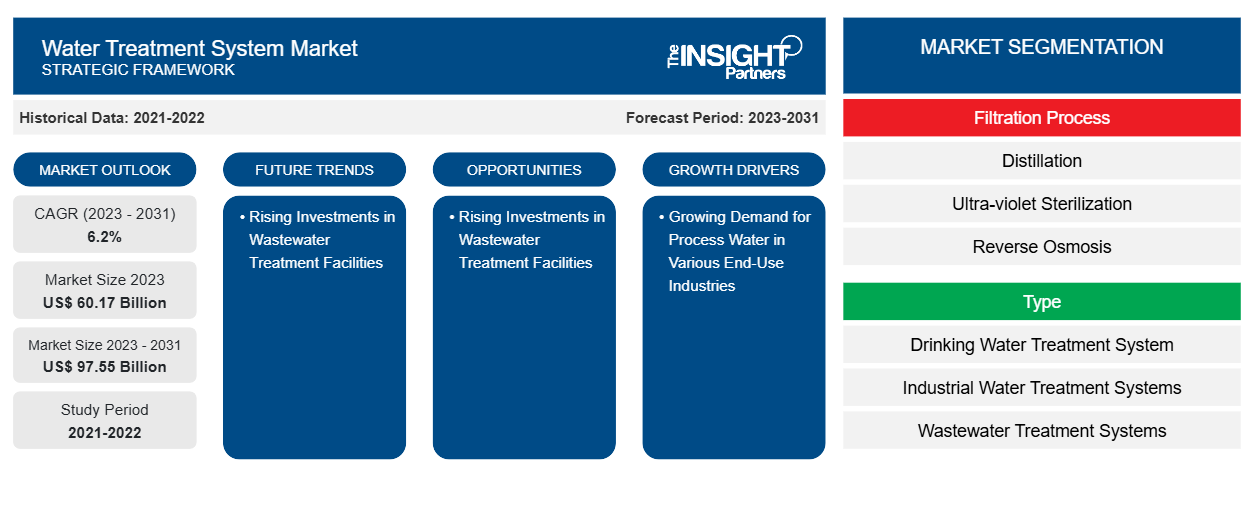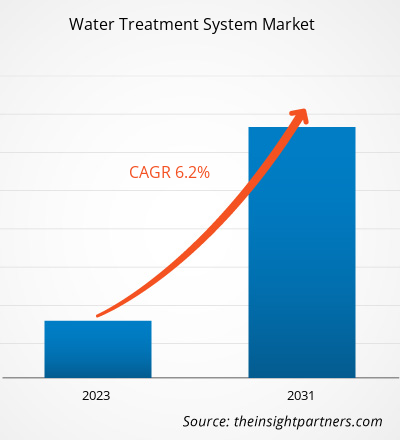预计到 2031 年,水处理系统市场规模将从 2023 年的 601.7 亿美元增至 975.5 亿美元。预计 2023-2031 年期间市场复合年增长率为 6.2%。新兴国家智慧城市的发展可能仍是市场的主要趋势。
水处理系统市场分析
全球范围内,发电、制造、制药、食品和饮料等各种终端行业对纯净水的需求正在增长。在这些终端行业中,清洁和纯净的水用于各种应用,包括蒸汽生成、稀释以及制造设备的清洗和冷却。这增加了农业、发电、制造和食品饮料等行业对可靠和持续供水的需求。能源和电力行业是水的主要终端用户之一。此外,食品和饮料行业也推动了全球对水处理系统的需求不断增长,因为清洁水被广泛用于食品生产、食品清洗、食品加工和保存。制造业也使用水过滤或处理系统来去除工业过程中使用的水中的污染物、杂质和其他不必要的物质。水处理系统对于提高产品质量、满足监管要求和设备保护至关重要,预计将在未来几年推动水处理系统市场的增长。此外,政府越来越重视在工业领域实施可持续的替代方案,这也推动了水处理系统的应用。
水处理系统市场概况
水处理系统是工业、住宅和商业部门水管理的重要组成部分。水处理系统的设计和开发是为了去除水中的杂质、污染物和有害或有毒物质。本报告研究的水处理方法包括蒸馏、过滤、紫外线灭菌和反渗透。水处理系统越来越多地用于地下水处理、咸水或海水处理、雨水收集和饮用水处理等应用。
由于人口增长、快速工业化和全球对水传播疾病认识的提高,对水的需求预计将增加,这将推动对水处理系统的需求。此外,预计全球对发电厂、住宅和商业建筑以及其他相关基础设施建设的投资将在未来几年推动市场增长。此外,预计中东和非洲对海水淡化和水净化的需求增加将在预测期内推动水处理系统市场的增长。
定制此报告以满足您的需求
您可以免费定制任何报告,包括本报告的部分内容、国家级分析、Excel 数据包,以及为初创企业和大学提供优惠和折扣
- 获取此报告的关键市场趋势。这个免费样品将包括数据分析,从市场趋势到估计和预测。
水处理系统市场驱动因素和机遇
各终端行业对工艺用水的需求不断增长
根据印度中央污染控制委员会 (CPCB) 的数据,印度工业每年使用约 5000 亿立方米的淡水。市政部门的不断发展也推动了对水处理系统的需求,特别是在中国、印度和巴西等经济体。
矿产勘探是水处理系统的主要应用领域之一,因为矿产勘探地点需要水净化系统来清洁设备和其他钻井过程。中国、澳大利亚、俄罗斯、巴西、加拿大和美国等国家广泛参与矿产勘探活动。这些国家还在推动新矿产勘探地点的发现以及现有地点的升级和维护,这预计将推动水处理系统在世界范围内的应用。因此,各种终端行业对纯净水的需求不断增长是水处理系统市场的主要驱动因素。
增加废水处理设施的投资
2022 年 3 月,美国内政部表示,垦务局在 2022 财年投资了 4.2 亿美元用于农村水利建设。除了政府资助外,全球多家水处理公司也在投资开发水处理设施。2023 年 10 月,Hydro 在德国施万多夫遗址资助了一座新的水处理厂。此外,2022 年 9 月,BIPSO 在其辛根工厂启动了其尖端的废水处理厂。该公司花费了 150 万美元开发这家工厂。因此,对水处理厂的投资增加预计将为水处理系统市场提供增长机会。
水处理系统市场报告细分分析
有助于得出水处理系统市场分析的关键部分是过滤过程类型、应用和最终用户。
- 根据过滤过程,水处理系统市场细分为蒸馏、紫外线灭菌、反渗透、过滤、离子交换等。反渗透部分在 2023 年占据了最大的市场份额。
- 根据类型,市场分为饮用水处理系统、工业水处理系统、废水处理系统、便携式水处理系统和井水处理系统。饮用水处理系统领域在 2023 年占据了市场主导地位。
- 根据应用,市场细分为地下水、咸水和海水淡化、雨水收集、饮用水等。地下水部分在 2023 年占据了最大的市场份额
- 根据最终用户,市场细分为住宅、市政、农业、食品和饮料、商业、采矿和金属、石油和天然气、制药等。市政部门在 2023 年占据了最大的市场份额。
水处理系统市场份额按地区分析
水处理系统市场报告的地理范围主要分为五个区域:北美、亚太、欧洲、中东和非洲、南美和中美。
中国、印度、澳大利亚、日本和韩国是亚太地区水处理系统市场的主要国家。中国和印度的高人口增长率、快速的工业化、对水污染认识的提高以及政府融资正在促进亚太地区水处理系统市场的增长。根据亚洲开发银行 (ADB) 的《2020 年亚洲水发展展望》报告,农村地区约 15 亿人和城市地区约 6 亿人缺乏足够的供水和卫生条件。此外,大多数亚行成员都面临着关键的水质问题。亚太地区各国政府正在采取措施制定部署水处理系统的标准和技术。快速的城市化和水驱动行业对清洁水的需求是推动亚太地区新兴经济体水处理系统市场增长的主要因素。2024 年 3 月,孟买大都会市政公司与印度孟买的 Welspun Enterprises 签订了一份合同,以开发和运营一座日处理能力为 20 亿升的水处理厂。因此,基础设施建设的不断加强以及政府对升级老化水处理设施和建设新设施的日益重视预计将推动亚太地区水处理系统市场的增长。
水处理系统市场区域洞察
Insight Partners 的分析师已详细解释了预测期内影响水处理系统市场的区域趋势和因素。本节还讨论了北美、欧洲、亚太地区、中东和非洲以及南美和中美洲的水处理系统市场细分和地理位置。

- 获取水处理系统市场的区域具体数据
水处理系统市场报告范围
| 报告属性 | 细节 |
|---|---|
| 2023 年的市场规模 | 601.7亿美元 |
| 2031 年市场规模 | 975.5亿美元 |
| 全球复合年增长率(2023 - 2031) | 6.2% |
| 史料 | 2021-2022 |
| 预测期 | 2023-2031 |
| 涵盖的领域 | 通过过滤过程
|
| 覆盖地区和国家 | 北美
|
| 市场领导者和主要公司简介 |
|
水处理系统市场参与者密度:了解其对业务动态的影响
由于消费者偏好的不断变化、技术进步以及对产品优势的认识不断提高等因素,最终用户需求不断增加,推动了水处理系统市场快速增长。随着需求的增加,企业正在扩大其产品范围,进行创新以满足消费者需求,并利用新兴趋势,从而进一步推动市场增长。
市场参与者密度是指在特定市场或行业内运营的企业或公司的分布情况。它表明在给定市场空间中,相对于其规模或总市场价值,有多少竞争对手(市场参与者)存在。
在水处理系统市场运营的主要公司有:
- 日立造船株式会社
- 滨特尔公司
- 特玛克斯有限公司
- 赛莱默公司
- 威立雅环境集团
- 颇尔公司
免责声明:上面列出的公司没有按照任何特定顺序排列。

- 了解水处理系统市场顶级关键参与者概况
水处理系统市场新闻和最新发展
水处理系统市场通过收集一手和二手研究后的定性和定量数据进行评估,其中包括重要的公司出版物、协会数据和数据库。水处理系统市场的一些发展情况如下:
- 领先的能源和环境解决方案提供商 Thermax 宣布在浦那开设其最先进的水和废水处理解决方案制造工厂。这标志着 Thermax 迈出了重要一步,符合其节约资源和保护未来的更广泛使命。(来源:Thermax,新闻稿,2024 年 4 月)
- 全球领先的过滤、分离和净化公司 Pall Corporation 和海湾合作委员会 (GCC) 知名石油服务公司 Tanajib [Al-Khobar] 宣布扩建其 Pall Arabia 工厂,以增加过滤聚结器制造能力,为沙特阿拉伯王国的石油和天然气及石化行业提供支持。(来源:XYZ 公司名称,新闻稿/公司网站/通讯,2024 年 2 月)
水处理系统市场报告范围和交付成果
“水处理系统市场”规模和预测(2021-2031)报告对以下领域进行了详细的市场分析:
- 范围内涵盖的所有主要细分市场的全球、区域和国家层面的水处理系统市场规模和预测
- 水处理系统市场趋势以及市场动态,如驱动因素、限制因素和关键机遇
- 详细的 PEST/波特五力分析和 SWOT 分析
- 水处理系统市场分析涵盖主要市场趋势、全球和区域框架、主要参与者、法规和最新市场发展
- 行业格局和竞争分析,涵盖市场集中度、热点图分析、知名参与者以及水处理系统市场的最新发展
- 详细的公司简介
- 历史分析(2 年)、基准年、预测(7 年)及复合年增长率
- PEST 和 SWOT 分析
- 市场规模价值/数量 - 全球、区域、国家
- 行业和竞争格局
- Excel 数据集



Report Coverage
Revenue forecast, Company Analysis, Industry landscape, Growth factors, and Trends

Segment Covered
This text is related
to segments covered.

Regional Scope
North America, Europe, Asia Pacific, Middle East & Africa, South & Central America

Country Scope
This text is related
to country scope.
常见问题
Regions such as Asia-Pacific, Europe and North America will boost the growth of the water treatment system market during the forecast period. This growth is owing to the rise in urbanization and industrialization in the regions.
Development of Smart Cities in Emerging Countries.
Hitachi Zosen Corporation; Pentair PLC; Thermax Limited; Xylem Inc; Veolia Environnement SA; Pall Corp; Culligan International Co; Dupont De Nemours Inc; Thermo Fisher Scientific Inc; 3M Co.; Aqua Filsep Inc; Pure Aqua, Inc.; RITE Water Solutions (India) Pvt. Ltd.; Aquatec International LLC; and Filtra-Systems Company LLC are the key market players operating in the global water treatment system market.
There is a growing demand for purified water in various end-use industries, such as power generation, manufacturing, pharmaceutical, and food & beverages. In these end-use industries, clean and purified water is utilized for various applications, including steam generation, dilution, and manufacturing equipment washing and cooling. This has mounted the requirement for a reliable and consistent water supply in sectors such as agriculture, power generation, manufacturing, and food & beverages. The energy & power sector is one of the major end users of water.
Governments worldwide are focusing on building wastewater treatment facilities. For instance, in August 2022, the United States Department of Agriculture announced a US$ 75 million investment in an infrastructure development project that involves offering clean drinking water and sanitary wastewater systems to Greenbrier County residents in the rural area.
Trends and growth analysis reports related to Manufacturing and Construction : READ MORE..
The List of Companies - Water Treatment Systems Market
- Hitachi Zosen Corporation
- Pentair PLC
- Thermax Limited
- Xylem Inc
- Veolia Environnement SA
- Pall Corp
- Culligan International Co
- Dupont De Nemours Inc
- Thermo Fisher Scientific Inc
- 3M Co.
The Insight Partners performs research in 4 major stages: Data Collection & Secondary Research, Primary Research, Data Analysis and Data Triangulation & Final Review.
- Data Collection and Secondary Research:
As a market research and consulting firm operating from a decade, we have published and advised several client across the globe. First step for any study will start with an assessment of currently available data and insights from existing reports. Further, historical and current market information is collected from Investor Presentations, Annual Reports, SEC Filings, etc., and other information related to company’s performance and market positioning are gathered from Paid Databases (Factiva, Hoovers, and Reuters) and various other publications available in public domain.
Several associations trade associates, technical forums, institutes, societies and organization are accessed to gain technical as well as market related insights through their publications such as research papers, blogs and press releases related to the studies are referred to get cues about the market. Further, white papers, journals, magazines, and other news articles published in last 3 years are scrutinized and analyzed to understand the current market trends.
- Primary Research:
The primarily interview analysis comprise of data obtained from industry participants interview and answers to survey questions gathered by in-house primary team.
For primary research, interviews are conducted with industry experts/CEOs/Marketing Managers/VPs/Subject Matter Experts from both demand and supply side to get a 360-degree view of the market. The primary team conducts several interviews based on the complexity of the markets to understand the various market trends and dynamics which makes research more credible and precise.
A typical research interview fulfils the following functions:
- Provides first-hand information on the market size, market trends, growth trends, competitive landscape, and outlook
- Validates and strengthens in-house secondary research findings
- Develops the analysis team’s expertise and market understanding
Primary research involves email interactions and telephone interviews for each market, category, segment, and sub-segment across geographies. The participants who typically take part in such a process include, but are not limited to:
- Industry participants: VPs, business development managers, market intelligence managers and national sales managers
- Outside experts: Valuation experts, research analysts and key opinion leaders specializing in the electronics and semiconductor industry.
Below is the breakup of our primary respondents by company, designation, and region:

Once we receive the confirmation from primary research sources or primary respondents, we finalize the base year market estimation and forecast the data as per the macroeconomic and microeconomic factors assessed during data collection.
- Data Analysis:
Once data is validated through both secondary as well as primary respondents, we finalize the market estimations by hypothesis formulation and factor analysis at regional and country level.
- Macro-Economic Factor Analysis:
We analyse macroeconomic indicators such the gross domestic product (GDP), increase in the demand for goods and services across industries, technological advancement, regional economic growth, governmental policies, the influence of COVID-19, PEST analysis, and other aspects. This analysis aids in setting benchmarks for various nations/regions and approximating market splits. Additionally, the general trend of the aforementioned components aid in determining the market's development possibilities.
- Country Level Data:
Various factors that are especially aligned to the country are taken into account to determine the market size for a certain area and country, including the presence of vendors, such as headquarters and offices, the country's GDP, demand patterns, and industry growth. To comprehend the market dynamics for the nation, a number of growth variables, inhibitors, application areas, and current market trends are researched. The aforementioned elements aid in determining the country's overall market's growth potential.
- Company Profile:
The “Table of Contents” is formulated by listing and analyzing more than 25 - 30 companies operating in the market ecosystem across geographies. However, we profile only 10 companies as a standard practice in our syndicate reports. These 10 companies comprise leading, emerging, and regional players. Nonetheless, our analysis is not restricted to the 10 listed companies, we also analyze other companies present in the market to develop a holistic view and understand the prevailing trends. The “Company Profiles” section in the report covers key facts, business description, products & services, financial information, SWOT analysis, and key developments. The financial information presented is extracted from the annual reports and official documents of the publicly listed companies. Upon collecting the information for the sections of respective companies, we verify them via various primary sources and then compile the data in respective company profiles. The company level information helps us in deriving the base number as well as in forecasting the market size.
- Developing Base Number:
Aggregation of sales statistics (2020-2022) and macro-economic factor, and other secondary and primary research insights are utilized to arrive at base number and related market shares for 2022. The data gaps are identified in this step and relevant market data is analyzed, collected from paid primary interviews or databases. On finalizing the base year market size, forecasts are developed on the basis of macro-economic, industry and market growth factors and company level analysis.
- Data Triangulation and Final Review:
The market findings and base year market size calculations are validated from supply as well as demand side. Demand side validations are based on macro-economic factor analysis and benchmarks for respective regions and countries. In case of supply side validations, revenues of major companies are estimated (in case not available) based on industry benchmark, approximate number of employees, product portfolio, and primary interviews revenues are gathered. Further revenue from target product/service segment is assessed to avoid overshooting of market statistics. In case of heavy deviations between supply and demand side values, all thes steps are repeated to achieve synchronization.
We follow an iterative model, wherein we share our research findings with Subject Matter Experts (SME’s) and Key Opinion Leaders (KOLs) until consensus view of the market is not formulated – this model negates any drastic deviation in the opinions of experts. Only validated and universally acceptable research findings are quoted in our reports.
We have important check points that we use to validate our research findings – which we call – data triangulation, where we validate the information, we generate from secondary sources with primary interviews and then we re-validate with our internal data bases and Subject matter experts. This comprehensive model enables us to deliver high quality, reliable data in shortest possible time.


 获取此报告的免费样本
获取此报告的免费样本